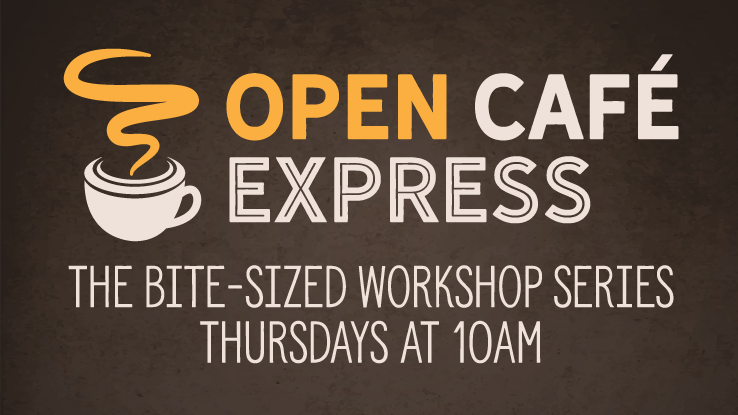
Open Education mini-workshops throughout the spring!

If you have been wanting to know more about Open Education and Open Pedagogy, tune into the Libraries on Thursday mornings at 10:00 a.m. throughout the spring for topical mini-workshops about getting up and running with Open.
In 30-minute Zoom sessions every Thursday, Open Café Express will cover topics including discovery and quality of Open Textbooks, how to harness Open Pedagogy to create memorable learning experiences, how to handle digital privacy issues, and how renewable assignments work. You'll also hear directly from some NC State faculty members who have already adapted Open Education into their own classes.
Pre-registration is not necessary—just join in the Zoom!
The spring 2021 schedule of Open Café Express workshops is below:
February 11: Discovering Open Textbooks
This workshop is for those who are interested in alternatives to the traditional textbook. Open textbooks can increase access to higher education by eliminating student costs and give faculty direct control over their instructional resources.
If you're interested in Open Textbooks or other types of Open Educational Resources (OER), but aren’t sure where or how to find them then this is the workshop for you.
Tune in for a quick overview of Open Textbook repositories and learn how to find the most relevant instructional resources for your course.
February 18: Is Your Textbook Watching You? Understanding Access and Data Privacy in Digital-Only Course Materials
Digital course materials and access codes can offer an enticing package, especially as instructors are making the transition to new ways of teaching. But these new tools bring a new set of questions about student privacy, for-profit incentives, and access across the digital divide. In this session we will explore the opportunities and challenges presented by digital-only course materials so you can make the best decision for your instruction and your students. (Zoom)
February 25: Evaluating the Quality of Open Textbooks
How reliable or trustworthy can educational materials be when they’re free of charge? There must be a catch?
Spoiler alert—there’s not! This session will give attendees the knowledge needed to evaluate and, where appropriate, begin incorporating Open Educational Resources (OER) into their courses. (Zoom)
March 4: Applying Open Pedagogy in a Large Enrollment General Education Course
Join Environmental First Year Director, Megan Lupek, and NC State University Libraries as they demonstrate how open education can be implemented in a large enrollment, distance education course. Dr. Lupek will discuss how she’s applied strategies used in the Alt-Textbook Grant and Open Incubator Program to incorporate Open Educational Resources (OER) pedagogy into her general education class. (Zoom)
March 11: Making Your Online Course Even Better with OER
With the shift to virtual learning, instructors are sometimes faced with rethinking classroom learning materials. This workshop will demonstrate how Open Educational Resources (OER) can sweeten the online experience for your pedagogy and your students. Joining us will be NC State Biology instructor, Melissa Ramirez, who will talk directly about her classroom experiences of integrating OER. (Zoom)
March 18: Renewable Assignments in Action! An Introduction to Open Pedagogy
This workshop introduces open pedagogy: a high-impact practice that empowers students by providing them an opportunity to engage in information creation through the use of renewable assignments. Joining us are NC State faculty members, Erin McKenney (Applied Ecology) and Carlos Goller (Biotechnology), who will share their experiences of implementing open pedagogy methods into their classrooms. Attend this workshop to learn about strategies for transforming your instruction and leave inspired to bring your passion to every class. (Zoom)
March 25: The Impact of OER on Student Success
In this mini-workshop we examine the impact of Open Educational Resources (OER) upon student success metrics. Recent studies suggest that day-one access to course materials, zero textbook costs, and innovative pedagogy that stimulates student engagement are all assets of OER that can contribute towards student success. Join us to learn more. (Zoom)